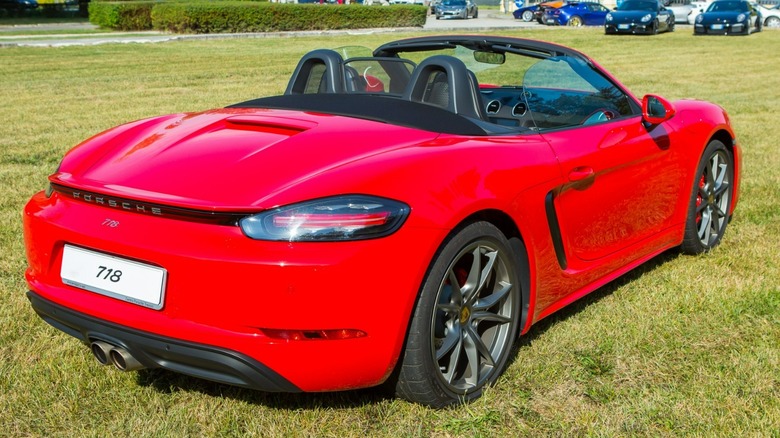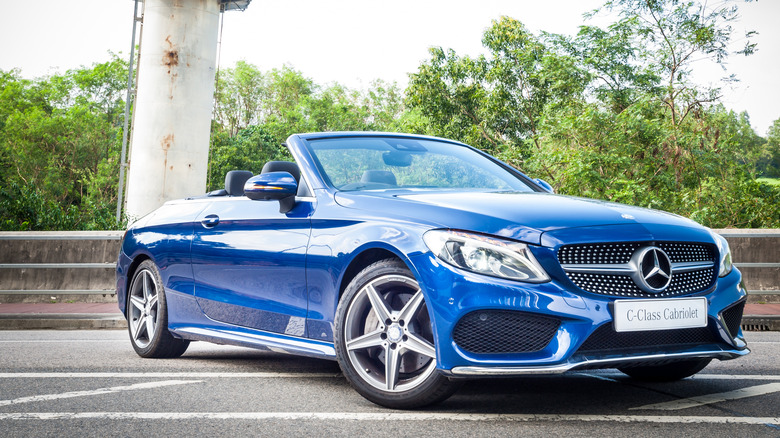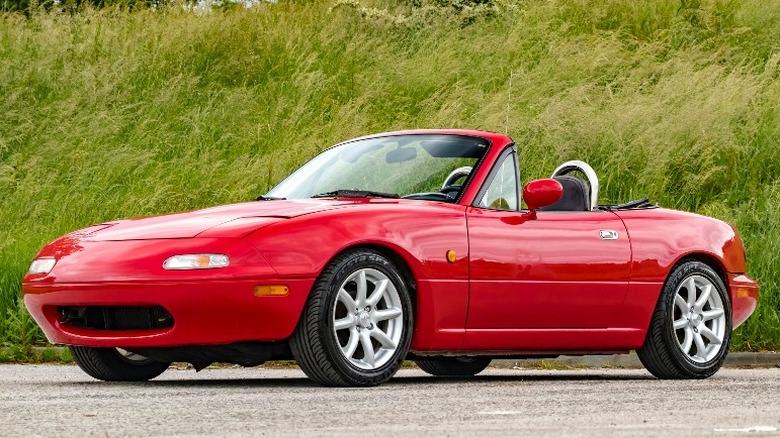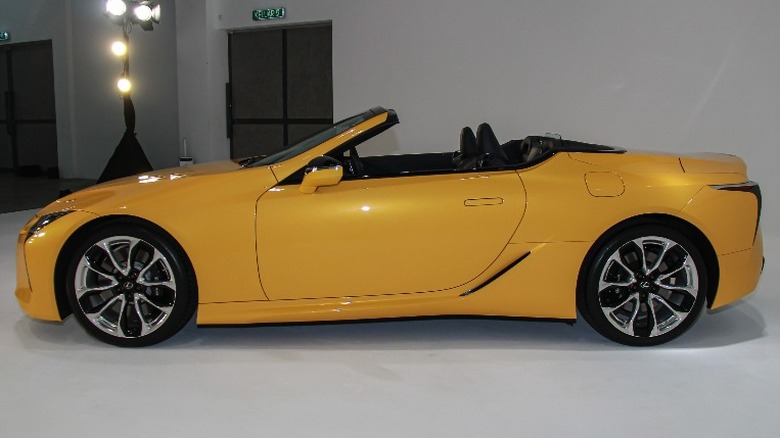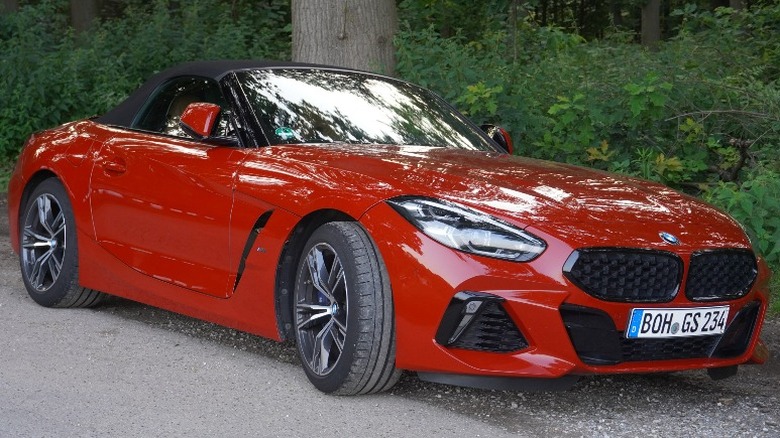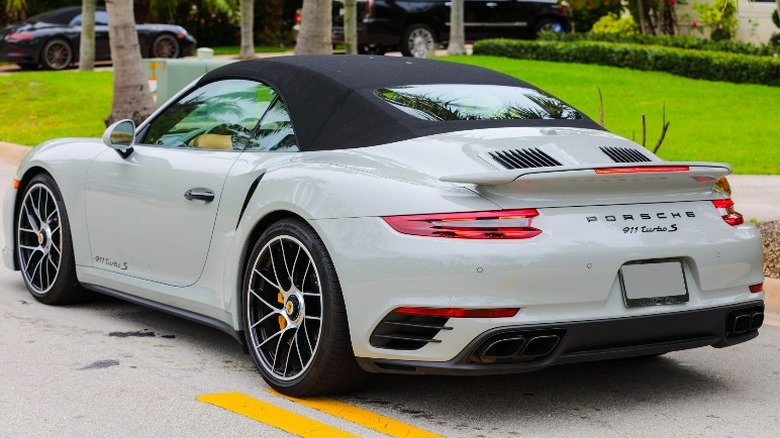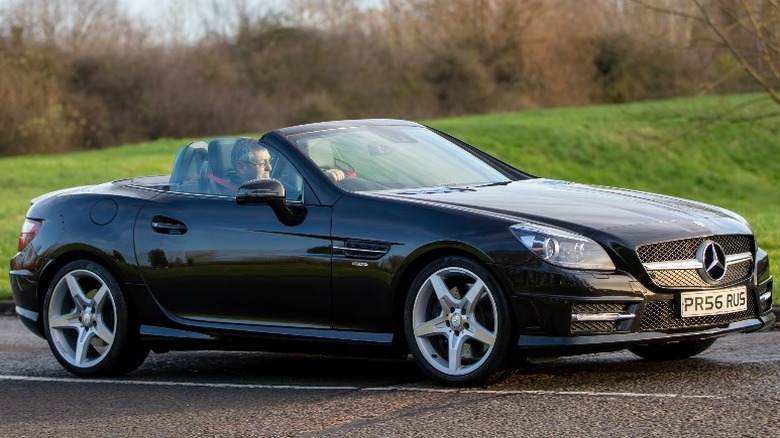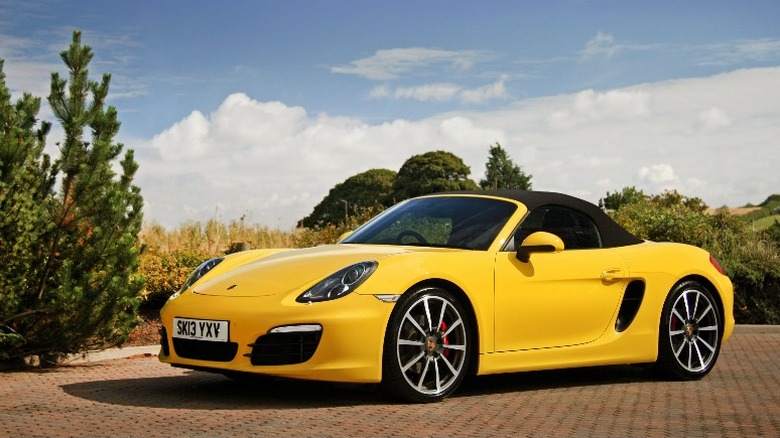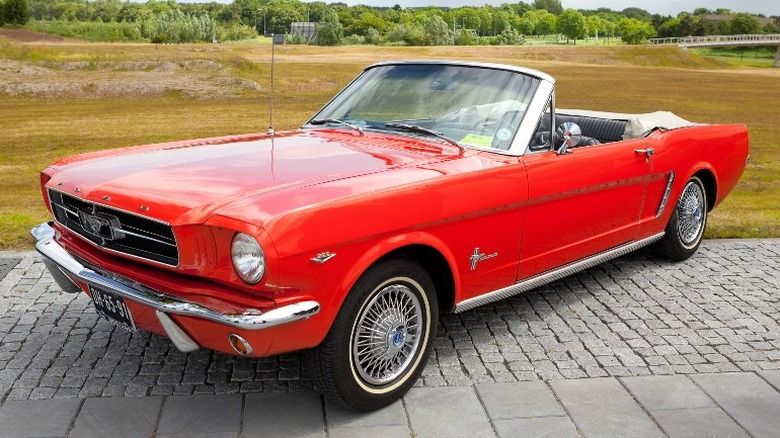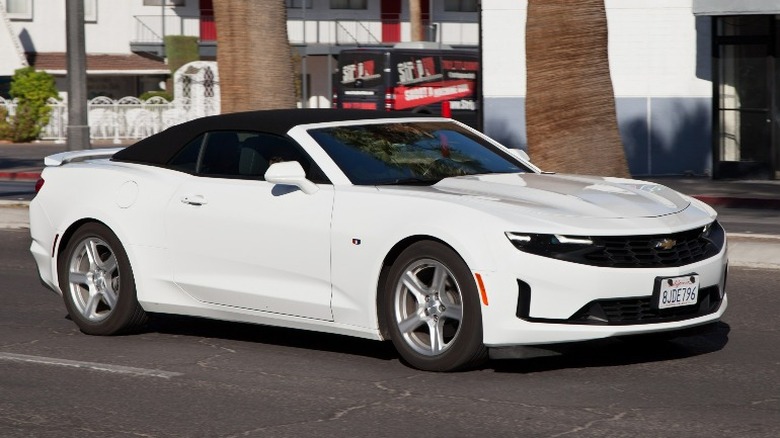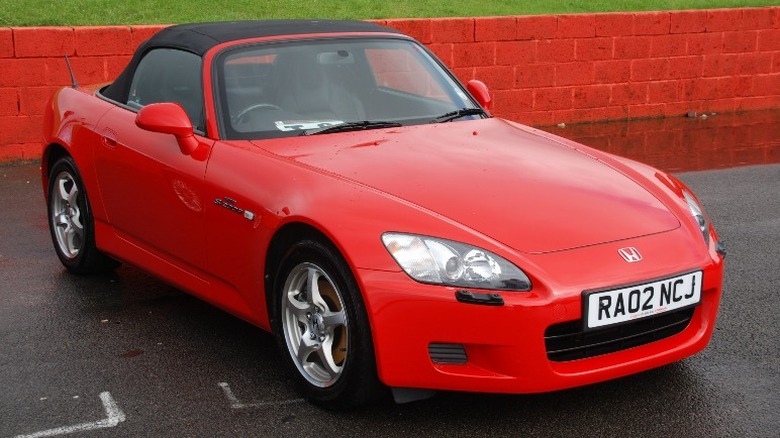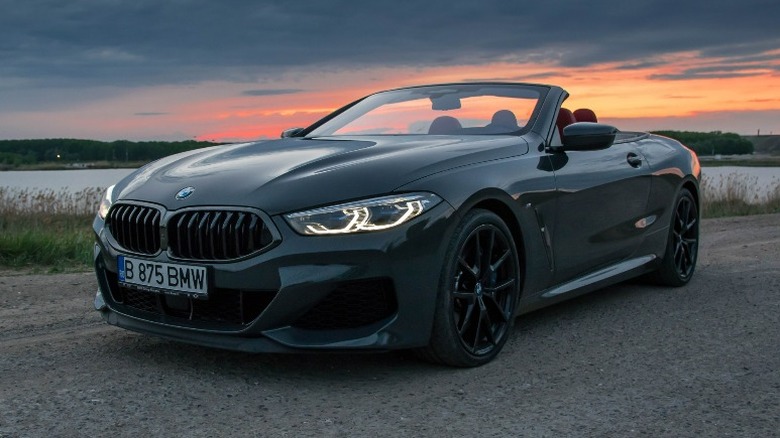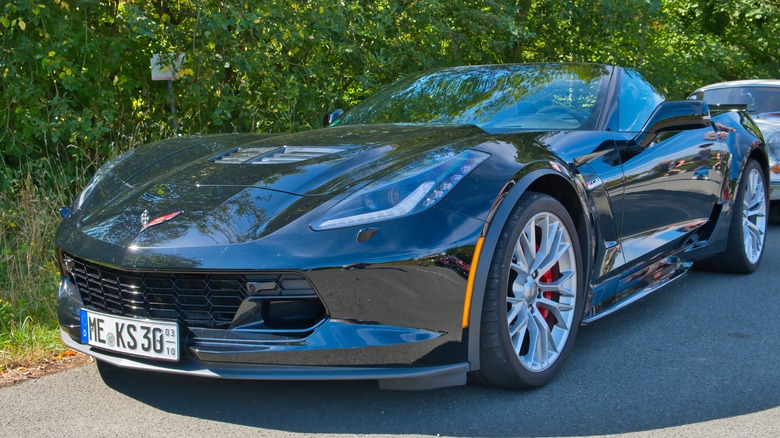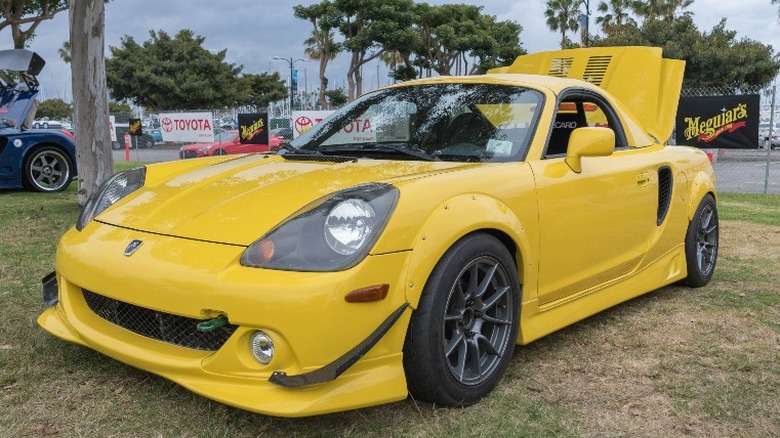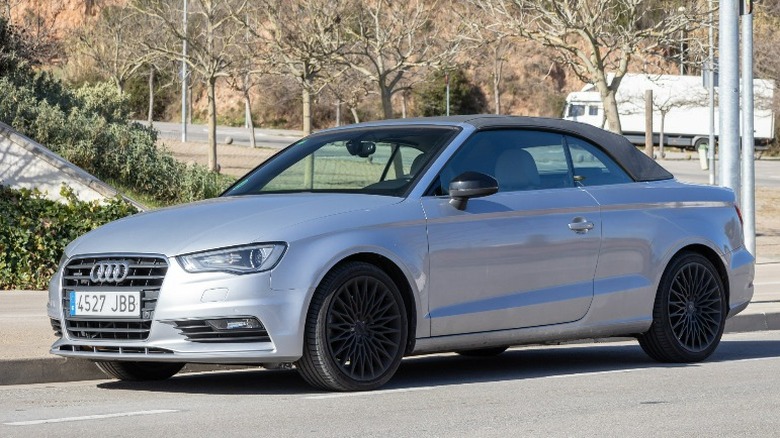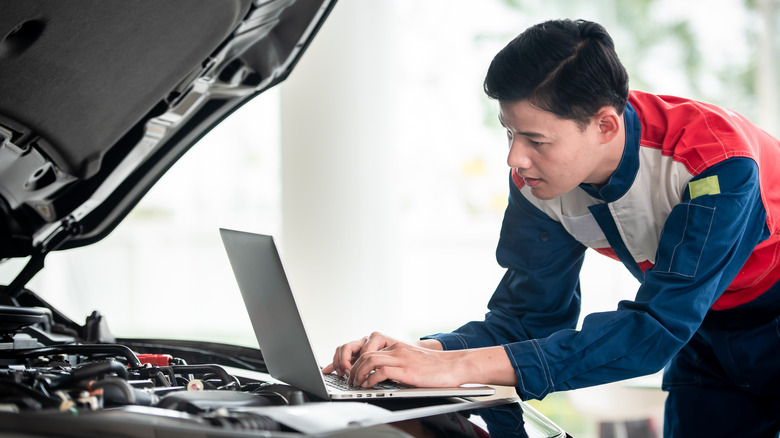The 14 Most Reliable Convertibles Of All Time, Ranked
Convertibles offer drivers an exclusive driving experience. With the roof down, you can enjoy the fresh air, the cool breeze, and an unobstructed view of everything around you. Choosing a convertible says something about you. However, even if the open-air drive is the experience of a lifetime, there's no enjoyment in driving an unreliable car.
While convertibles do have their downsides, including less rigidity and a slightly lower top speed, there doesn't seem to be much notable difference in reliability between a regular coupe and its topless equivalent. Many of the parts are the same, and the roof itself is really the only potential snag — although modern convertibles tend to have mechanical tops that feature a number of moving parts. These are obviously more likely to fail than a solid, fixed, metal canopy.
Based on our research, none of the vehicles here tend to have notably unreliable roofs. We used several factors to compile our ranking, including verified customer responses to JD Power surveys, the relative age of the vehicles, and the cost of fixing anything that does go wrong. Our methodology is explained in greater detail at the end of the article. So, without further ado, here are the 14 most reliable convertibles you can currently buy.
14. Mercedes Benz C Class Cabriolet
The Mercedes Benz C Class is a staple of the German automotive giant's lineup. The sedan tends to offer a similar balance between sportiness and seriousness as the BMW 3 Series or the Audi A4. However, if you want to tip the balance towards the "fun" side and away from the "job in the finance sector" side, then consider buying the convertible version. As a bonus, you'll have a very reliable vehicle.
With a score of 77, the 2024 C Class Cabriolet just misses out on a top-five spot in J.D. Power's reliability rankings for its compact premium car class. The 2024 model has the same score as its predecessor, but the vehicles may have been more reliable in the past. The C Class scored 79 in 2021 and 2020, 80 in 2019, and 81 in 2018. The 2014 model had a Consumer Rating of 85, which would single it out as one of the best cars on this list. So it may make sense to opt for an older model if reliability is your main concern — just make sure the paperwork shows it's been properly maintained along the way.
The C Class' reliability is likely to come in handy, as repairs on a precision-engineered German vehicle aren't exactly cheap. Still, if you want something stylish and a little sensible while maintaining that sporty edge, then a convertible C Class is a solid option.
13. Mazda MX-5
The Mazda MX-5 ranks at or near the top of every automobile magazine's list of most reliable convertibles. In 2011, J.D. Power rated the Mazda roadster as the top sports car, based on its survey of vehicle dependability, with a satisfaction rating of 82.4%, even higher than the previous year's rate.
The 2011 Mazda MX-5 Miata convertible came with a 2-liter I4 generating 158 horsepower at 6700 rpm and a maximum torque of 140 lb-ft. at 5000 rpm. Mazda equipped all the Miata trims with the same engine, so the performance remained the same. The sports car accelerated to 60 mph in 6.85 seconds and reached the quarter mile in 15.45 seconds. Although the MX-5 acceleration was respectable, it was the slowest in its class. The 2011 Porsche Boxster Spyder accelerated to 60 mph in a blistering 4.9 seconds and hit the quarter mile in 12.8 seconds.
Since its introduction in 1989, the MX-5 has been a popular choice for budget sports car enthusiasts. Owners claim it is "an exciting car to drive, despite the lack of horsepower," and today, the modern Mazda follows the same formula. Guinness World Records certified the MX-5 as the "Best selling two-seater sports car" when sales reached 531,890 units in May 2000, and by 2011 the figure had reached 900,000 units. Pure driving enjoyment and reliability no doubt contributed to the success.
12. Lexus LC 500 Convertible
At a starting price of $102,125, the 2021 Lexus LC 500 is not only a top-of-the-line luxurious convertible but boasts a performance to match. The 5.0-liter naturally aspirated V8 engine generates 471 horsepower and 398 lb-ft of torque, competitive with many high-performance sports cars. A 10-speed automatic sends power to the rear wheels. Lexus offers the LC 500 as a Coupe, with a hybrid powertrain, and a Convertible that comes in a single trim level. The sleek and sporty exterior design of the Convertible is like the Coupe with a spindle grille and LED headlights but instead of the semi-floating Coupe roof, it features a power-operated soft-top.
The Lexus LC 500 interior is loaded with premium materials such as leather, aluminum, and even carbon fiber (optional). The exquisite craftsmanship and luxurious feeling are far superior to that of a mass-produced M850i Convertible. Although the trunk space won't hold much luggage, and interior storage space is restricted, the convertible top doesn't spoil the LC's quiet refinement.
J.D. Power rates the Lexus 86/100 for Quality and Reliability. Although the 2021 Lexus LC 500 Convertible has incomplete data for the initial three-year period, the luxury car boasts the Lexus tag, a division of Toyota with a long track record of building exceptional vehicles with superior build quality and resilience to easy breakdowns.
11. BMW Z4 (E89) Roadster
Produced from 2009 to 2016, the second generation two-door BMW Z4 roadster was the first Z-Series model to employ a retractable hardtop roof. Trims offered ranged from the Z4 sDrive18i Roadster producing 156 horsepower at 5,000 rpm and a maximum torque of 177 lb-ft to the high-performance Z4 sDrive35is generating 340 horsepower at 5,900 rpm and a maximum torque of 332 lb-ft at 1500 rpm. The Roadster with manual transmission accelerates from 0 to 62 mph in 7.9 seconds. The high-performance trim exhibits exceptional handling with the M Sports Package, the M Aerodynamics Package, a double-clutch automatic gearbox, and adaptive M Suspension featuring electronically controlled dampers.
Withclutch.com reviewed data from warranty companies, RepairPal, and long-term quality studies to determine the maintenance costs and the overall reliability of a BMW Z4. The roadster scored high for reliability with a rating of 76.55 compared to the average overall rating of 57. The study gives different results than those found in J.D. Power and Consumer Reports, which rely on issues in the first months of ownership reported to the dealership and surveys consisting of owner reviews during longer periods. The withclutch.com rating is based on data consisting of the maintenance cost and frequency required as reported by repair shops, the warranty coverage, and the length of time these vehicles are typically kept on the road.
10. Porsche 911 Turbo S Convertible
The iconic Porsche 911 began in 1964 as a no-frills upgrade to the highly successful Porsche Model 356. The Turbo S Convertible is ranked as one of the most reliable convertibles on the market.
The 2021 Porsche 911 Turbo S Convertible sets the standard for high-performance convertibles, powered by a 3.8-liter twin-turbocharged Flat-6-cylinder engine that cranks out an impressive 650 horsepower and 560 lb-ft of torque. The convertible reaches the quarter mile in a mere 10.2 seconds. The remarkable engine and aggressive launch from the 8-speed PDK (double-clutch transmission) power the supercar to 60 mph in a blistering 2.5 seconds, which is competitive with the fastest high-performance EVs including the Tesla. While the 911's top speed at 205 mph is comparable to other cars in its class, such as the 2021 Audi R8 Spider and McLaren 600LT Spider, the Porsche accelerates to 60 mph .8 seconds faster than the R8 and .4 seconds faster than the 600LT.
J.D. Power rated the 2021 Porsche 911 Turbo S convertible with an overall score of 79 out of 100 based on its standard criteria: driving experience, resale value, quality and reliability, and dealership experience.
9. Mercedes-Benz SLK
Mercedes offered the SLK in four trims: the model 400 equipped with a 3.0-liter twin-turbocharged V6, the model 500 with a 4.6-liter V8, the 63 AMG model with a V8, and the V12-powered AMG 65. All trim levels featured a power-retractable hardtop roof that Mercedes claims converts the convertible to a coupe in a mere 22 seconds.
SLK standard equipment includes two-stage belt force limiters, head/thorax sidebags, and adaptive front airbags. The passenger seat has a sensor that detects occupancy and has an automatic child seat recognition facility. Unique aerials in the seat cushion exchange data with the transponders that are installed in the base of special-designed child safety seats. The central control module detects when a child's seat is occupied, causing it to deactivate the passenger side airbag, reducing the risk of injury to a small child if deployed.
Mercedes introduced several technical improvements on the 2007 SLK including the unique 7G-TRONIC seven-speed automatic transmission, bi-xenon headlamps with cornering light function, and automatic climate control. But, perhaps the most intriguing new feature was the innovative Airscarf neck-level heating system that extended the open-top roadster experience to year-round. When activated, warm air flows out from the head restraints, allowing passengers to stay comfortable with the roof down on cold days.
J.D. Power gave the 2007 SLK an overall rating of 81 and a Quality and Reliability rating of 84 out of 100 based on the vehicle owner's experience.
8. Porsche Boxster
Porsche has a reputation for producing some of the highest performing sports cars on the market, and over the years has also developed a tradition of reliability. The brand's entry-level convertible, the 2020 Porsche 718 Boxster, is one of the most reliable convertibles available today. An excellent recall record over the past several years has contributed to its J.D. Power rating of 79, a remarkable score for a performance vehicle.
Derived from the 718 Cayman coupe, the Boxster is a two-seat rear-wheel-drive roadster with a power-operated soft top. The standard equipment engine is a turbocharged 2.0-liter flat-four-cylinder producing 300 horsepower, but Porsche offered an upgrade to the S-model with a 2.5-liter four-cylinder generating 350 hp or the more powerful GTS- model with a 4.0-liter six-cylinder making about 365 horsepower (power ratings varied with trim levels). All Boxster models came with a six-speed manual transmission or the optional seven-speed automatic, and each offered more than adequate acceleration, superb handling, and an elegantly tailored interior.
The Boxster performance is remarkably responsive, providing acceleration to 60 mph in 4.4 seconds, and the tight steering means simple adjustments result in dramatic moves. The mid-engine provides ideal weight distribution and combines with the stiff suspension to give the Boxster handling characteristics of a true high-performance sports car. In addition to the outstanding driving performance and great build quality, reliability makes the Boxster an excellent choice for a convertible sports car.
7. Ford Mustang
Mustangs have a tradition of high performance, and the 2020 convertibles are no different. For the 2020 model year, Ford offered the rear-wheel-drive "pony car" with a choice of a turbocharged Ecoboost 2.3-liter four-cylinder engine or a monster 5.0-liter V8 generating 460 horsepower. While the 5.0-liter V8 powerplant is in line with traditional Mustang muscle car themes, the entry-level option has always been a bit anemic by comparison. However, for the 2020 Mustang, Ford upgraded the smaller mill to produce a respectable 310 horsepower and 350 lb-ft of torque. The automaker also offered an optional four-cylinder engine with the High-Performance pack that cranks out 332 horsepower and 350 lb-ft of torque. A six-speed manual transmission is standard, and a 10-speed automatic is optional.
According to Car Indigo, the 2020 Mustang with the four-cylinder Ecoboost engine is exciting to drive. An improved suspension helps for fast starts resulting in acceleration to 60 mph in a class-leading 5.1 seconds. Not bad for a four-cylinder powerplant. For those muscle car traditionalists who thirst for maximum power, the 5.2-liter supercharged V8 Shelby GT500 Mustang generates 760 horsepower and 625 lb-ft of torque. The convertible reaches 60 mph in a blistering 3.3 seconds and has a top speed of 186 mph. Although Ford is not known as the most reliable brand, the Mustangs have traditionally been more dependable than the other models. RepairPal gives recent Mustangs an excellent reliability score of 4.0 out of 5.0.
6. Chevrolet Camaro 1LT
Although the Porsche 911 and Mercedes-Benz SL are faster, the Camaro 1LT offers the owner an exhilarating driving experience at a much lower price point. Introduced in 1967 as Chevrolet's answer to the Ford Mustang, over the years the Camaro muscle car has evolved into a sports car with pony car characteristics. Today, the Camaro competes with Subaru BRZ, Toyota GR6, Dodge Challenger, and of course the Mustang.
Chevrolet equips the 2022 model with several engine options: the base model turbocharged 2.0-liter four-cylinder making 275 horsepower and 295 lb-ft of torque, the 3.6-liter V6 generating 335 horsepower and 284 lb-ft of torque, the 6.2-liter V8 with 455 horsepower and 455 lb-ft of torque, and the supercharged 6.2-liter V8 producing a whopping 650 horsepower and 650 lb-ft of torque. A standard equipment six-speed manual, optional eight-speed automatic, or 10-speed automatic (with V6 and V8 engines) sends power to the rear wheels.
The convertible also offers a reliable ride. Edmunds rates the Camaro 1LT reliability at five stars out of five. In recent years, the Camaro has ranked near the top of the annual J. D. Power Vehicle Dependability Study (VDS) list.
5. Honda S2000
Honda introduced the S2000 in 1999 as a more expensive alternative to the Mazda MX-5 and a lower-priced competitor for the costly BMW M Roadster and Boxster S. The S2000 MSRP in the first year of production was $28,282 ($44,177 adjusted for inflation to 2020 dollars), compared to the MX-5 MSRP of $20,095 ($31,388 adjusted). Today, many still consider the S2000 to be among the finest open-top sports cars ever produced, becoming a popular choice for both enthusiasts and collectors.
The sports car derived its name from the 2.0-liter (2000 cubic centimeters of displacement) inline four-cylinder DOHC-VTEC engine. The mill's power ranged from 237 to 247 horsepower at 8,300 rpm and 153 to 161 lb-ft of torque, making it the world's highest specific output of a normally aspirated production car engine at the time.
According to Motor Trend, Honda engineers mounted the engine, mated to a six-speed manual transmission, entirely behind the front axle to achieve a near-perfect weight distribution of 50:50. The engineering team also designed a lightweight body (total weight of 2,800 pounds) and chassis combining it with electrically assisted steering, an independent double wishbone suspension, and a limited-slip differential for optimal handling. Although Honda built the S2000 with performance in mind, the car also displayed Honda's reputation for reliability. Warranty Direct's Reliability Index notes results of a comprehensive car reliability study in the UK showing the Honda S2000 placed second (behind only the Mazda MX-5) in reliability with a reliability index of 34.31.
4. BMW 4 Series Convertible
Introduced in 2014, the BMW 4 Series has a stellar record for reliability. The engine has proven to be durable with no serious problems reported. Four complaints are listed on the NHTSA website for the 4-Series, but all are minor issues and none of them have resulted in fire, injury, or death. J.D. Power gave the car a rating of 81 out of 100 in its reliability category.
BMW offered three versions of its 4 Series cars for both the first and second generation (2014-present): a two-door coupé, a two-door convertible, and a five-door liftback/fastback sedan (four-door for the first-generation Gran Coupé). Since its introduction in 2014, BMW has offered the Series 4 with multiple engine options, and (according to BMW) the 2022 model is equipped with a turbocharged 2.0-liter four-cylinder generating 184 horsepower at 6,500 rpm and 300 Nm of torque from 1,350 to 4,000 rpm. The Bimmer accelerates to 100 km/h in 8.2 seconds and reaches a maximum top speed of 236 km/h.
The luxurious, stylish, and fun-to-drive BMW 4 Series offers significant competition for the Audi A5. However, the BMW boasts one feature that distinguishes the car from the Audi. The 4 Series convertible employs a power-retractable hardtop roof instead of a soft top. The secure-sealing hardtop provides better all-weather insulation, a much quieter ride, and more natural-looking styling when the hardtop is in place.
3. Chevrolet Corvette
There are few better looking cars than the Chevrolet Corvette, and it turns out there are few that are more reliable. The first Corvette rolled off the production line more than 70 years ago, and over the last few years, the sports car has been dominating J.D. Power's reliability rankings.
It's placed in the top three for four years running, scoring a consistent 86 or 87 and nabbing the top spot for the J.D. Power Premium Sporty Car category in 2022. This doesn't mean you should seek out a 2022 model specifically, though, as those consistent scores mean everything beyond 2021 has offered a similar level of reliability. Still, its long history and strong showing in recent J.D. Power Rankings are enough to net the Chevrolet Corvette a high position on our list.
The coupe version of the Corvette may get more attention, but the convertible is absolutely stunning. It ticks all of the topless sports car boxes — it looks sleek, it feels fast, and it sounds absolutely great. The fact it will spend more time on the road and less time in the repair shop than the majority of its peers may be enough to seal the deal on this absolute gem.
2. Toyota MR2 Spyder
Toyota has a tradition of building reliable vehicles and the MR2 Spyder is no exception. Cars notes that many of the owners surveyed were more than pleased with the car reporting it "drove like a dream" and found it dependable, giving the convertible a rating of 5 out 5 for reliability.
The first- and second-generation MR2 cars were offered from the factory as coupes with either T-tops or full Targa tops featuring removable roof panels as an option. Only the Spyder featured a folding soft top. While most mid-engine designs are found in high-performance expensive sports cars, the MR2 Spyder offered a unique and affordable alternative. The mid-engine placement results in even weight distribution and under acceleration, some weight shifts toward the back, providing better traction. The weight shift also gives the nose a light and responsive feel, and the visibility is better without a bulging front hood to hide the engine.
Toyota manufactured the MR2 Spyder for the 2000-2005 model years with few changes over its six-year lifespan. According to Motor Bisquit, every model year MR2 was paired with a naturally aspirated 1.8-liter four-cylinder that generated 138 horsepower and 125 lb-ft of torque. Toyota installed the same engine in many other models of the time such as the base Celica, Corolla, and Matrix. For the first two years, the Spyder came only with a five-speed manual transmission. In 2002 it was upgraded to an unusual five-speed sequential manual and then a six-speed manual the following year.
1. Audi A3 Cabriolet
Audi introduced the A3 Cabriolet in 2008 and offered the model for three generations. According to Auto Evolution, a variety of engine options included gasoline (1.2L, 1.4L, 1.8L, 2.0L) and diesel (1.6L, 1.9L, 2.0L) with power output varying from 110 horsepower to 200 horsepower. Two of the best performing engines were the 1.5-liter turbocharged gasoline, badged 35 TFSI, and the 2.0-liter turbo 40 TFSI. Whatcar.com found that both engines demonstrated a strong pull at low RPM with a brisk feel at high rpm.
The 2016 Audi A3 Cabriolet 2.0 two-door TFSI Komfort featured a 2.0-liter L4 turbo DOHC 16-valve engine producing 220 horsepower at 4500 rpm and 240 Nm of torque. With a six-speed automatic transmission/manual mode gearbox, the convertible reaches a top speed of 222 km/h, accelerates to 60 mph in 7.6 seconds, and hits the quarter mile in 14 seconds flat.
The Cabriolet accommodates up to four passengers and features stability control, traction control, and anti-lock brakes (ABS). Independent suspension is used in both the front and rear. Safety amenities include a driver-side front airbag, passenger-side front airbag, and rear parking sensors.
After three years of production, Audi's reliability remained consistent with a J.D. Power ranking of 83/100 measuring design flaws, defects, and malfunctions experienced by vehicle owners. Whatcar.com placed the A3 Convertible near the top of its newer car survey of convertibles for reliability with a score of 84.6%.
How we compiled this list
Several factors were considered when choosing our list of most reliable convertibles. JD Power's rankings, which are based on detailed survey feedback from verified car owners, heavily influenced our choices. JD Power's surveys tend to cover the first three months of ownership, so some early 2024 models have made it into the mix.
We also tried to strike a balance between older and newer cars based on how reliable they're likely to be. Newer cars tend to be more reliable, as materials and manufacturing processes are continuously improving. Older cars, especially those that haven't been properly maintained, will also suffer due to wear and tear on the parts. Even properly maintained older vehicles will contain parts that are nearing the end of their lifespans.
Conversely, less data is available on newer cars, and manufacturers will have had less time to resolve any teething problems. Parts for newer vehicles also tend to be more expensive, and cheaper aftermarket parts are usually unavailable. So, while issues may be rarer, they'll also be more expensive to fix. All of these factors were considered and factored into our final rankings.
